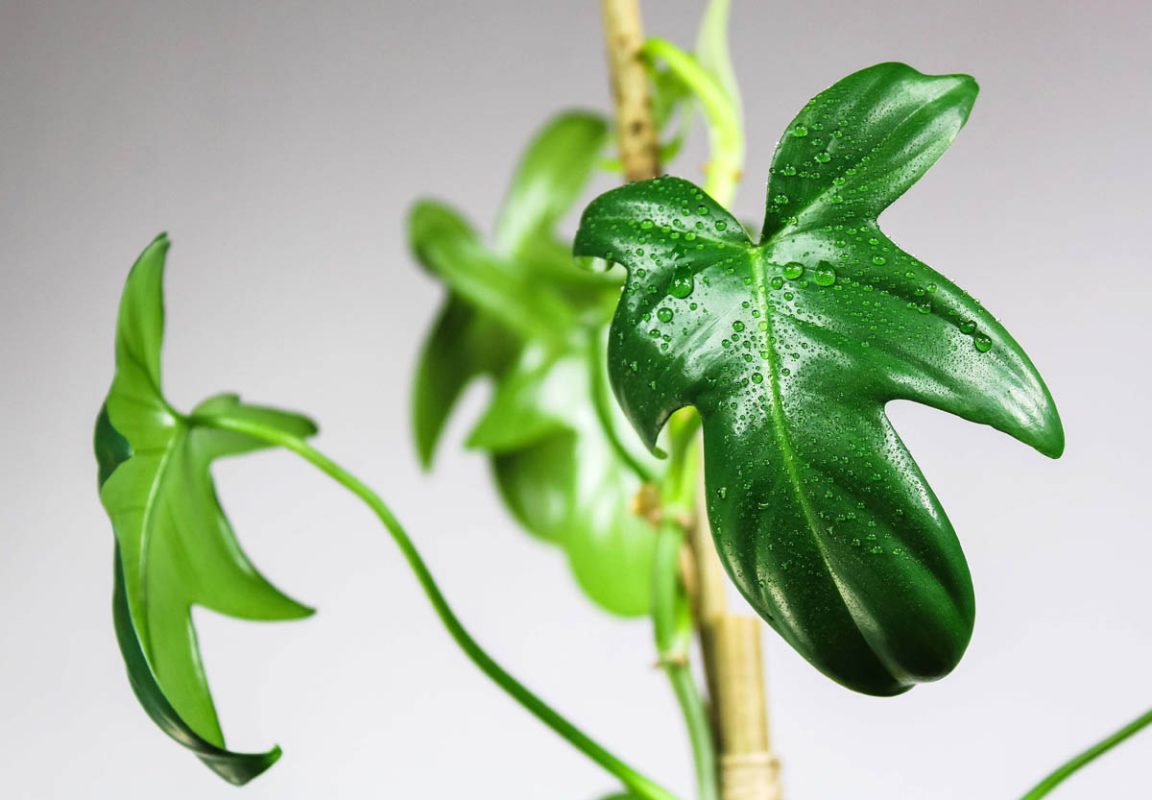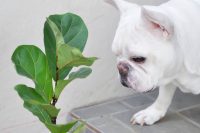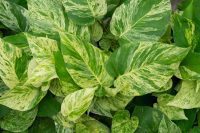Fiddleleaf philodendron (Philodendron bipennifolium) is toxic to dogs. The toxic principle is insoluble calcium oxalate crystals which `are produced by specialised cells known as idioblasts. When the dog chews the leaves or stem of fiddleleaf philodendron, these needle-sharp crystals are released, causing intense pain and burning.
What is fiddleleaf philodendron?
| Family | Araceae |
| Botanical name | Philodendron bipennifolium |
| Common names | Fiddleleaf philodendron, Horsehead philodendron, Lacy tree philodendron |
| Toxicity | Toxic to dogs |
| Toxic parts | All parts |
| Toxic principle | Insoluble calcium oxalate crystals |
| Severity | Moderate |
Fiddleleaf philodendron is a hemiepiphyte, which means it starts its life in the soil, and as it grows, attaches to a tree and climbs towards the top of the rainforest canopy. Its unique glossy, fiddle-shaped leaves and ease of care make the fiddleleaf philodendron a popular ornamental houseplant, or landscaping plant in warm climates.
Fiddleleaf philodendron and fiddle-leaf fig are commonly mistaken. The fiddle-leaf fig is a member of the Ficus family, and contains ficin and ficusin, which are toxic to dogs while the fiddleleaf philodendron belongs to the Philodendron family and contains insoluble calcium oxalate crystals.
Related: Is ficus toxic to dogs?
Toxic properties?
The toxic properties are insoluble calcium oxalate crystals. These needle-sharp crystals are known as raphides and are located close to the surface of the stems and leaves. When the dog applies pressure by chewing any part of the plant, the crystals are ejected and penetrate the delicate tissues of the mouth causing intense pain and the release of histamine. This type of toxicity is known as mechanical irritant contact dermatitis.
The University of California rates Philodendron species as category three and four.
- Oxalates: The juice or sap of these plants contains oxalate crystals. These needle-shaped crystals can irritate the skin, mouth, tongue, and throat, resulting in throat swelling, breathing difficulties, burning pain, and stomach upset. Call the Poison Control Center or your doctor if any of these symptoms appear following ingestion of plants.
- Dermatitis: The juice, sap, or thorns of these plants may cause a skin rash or irritation. Wash the affected area of skin with soap and water as soon as possible after contact. The rashes may be very serious and painful. Call the Poison Control Center or your doctor if symptoms appear following contact with the plants.
Clinical signs
The onset of symptoms is rapid, and in most cases will result in a cessation of the behaviour. Puppies are at increased risk due to their curious nature and tendency to chew, especially when teething.
- Pain
- Acute stomatitis (inflammation of the mouth)
- Burning
- Salivation
- Dysphagia (difficulty swallowing)
- Pawing at the mouth
- Swelling of the gums, mouth and throat
- Difficulty swallowing and breathing
First aid
If it is safe to do so, remove any remaining plant matter from the dog’s mouth and offer a drink of something tasty such as milk. Contact your veterinarian or pet poison helpline for advice. If the dog appears otherwise fine, the veterinarian may recommend you closely monitor the dog over the next 24-48 hours and if clinical signs develop, bring the dog in for treatment.
Treatment
There is no antidote to fiddleleaf philodendron ingestion and the goal of treatment is to prevent further absorption as well as manage clinical signs.
If ingestion was recent, the veterinarian can administer medication to induce vomiting, followed by activated charcoal to bind to any remaining plant matter in the gastrointestinal tract. Antiemetics and gastric protectants can be prescribed for dogs who are vomiting. As a precaution, the veterinarian may also administer intravenous fluids to treat or prevent dehydration and electrolyte derangements.
Most dogs who have consumed fiddleleaf philodendron can go home within a day or two. The veterinarian may recommend a bland diet to rest the gastrointestinal tract for a few days.
Prognosis
The prognosis for dogs who have ingested fiddleleaf philodendron is excellent and most dogs can be expected to make a rapid recovery.
Julia is a writer and landscape consultant from Wollongong with a love of horticulture. She had been an avid gardener for over 30 years, collects rare variegated plants and is a home orchardist. Julia is passionate about learning and sharing her knowledge of plant propagation and plant toxicology. Whether it’s giving advice on landscape projects or sharing tips on growing, Julia enjoys helping people make their gardens flourish.




